Blog / Why Career College Hands-On Training is Important
Why Career College Hands-On Training is Important
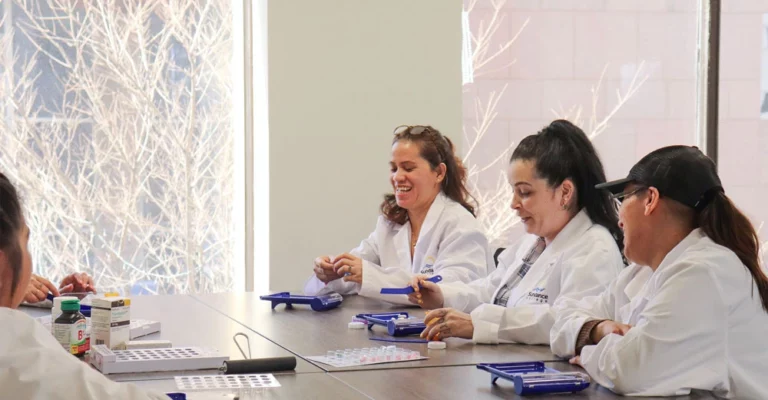
Explore our Diploma Programs
- Business, Hospitality, and Legal
- Health and Human Services
- Technology
Table of Contents
In the bustling hospital reception on a summer day, Mrs. Johnson, a familiar face at the medical office, approached the counter with visible distress. “Cathie, I’m not feeling well today,” Mrs. Johnson’s voice trembled.
“Let’s check your blood pressure, Mrs. Johnson,” offered Cathie, a seasoned medical office administrator. Leading the senior to a spot for a health check-up, Cathie prepared for the procedure.
Out of the blue, Mrs. Johnson slumped, losing color. A quick check revealed no pulse, prompting Cathie to call for urgent help. With practiced precision, she moved Mrs. Johnson to the floor, starting chest compressions.
“Come on, Mrs. Johnson, don’t give up on me now…”
Moments later, Mrs. Johnson, now conscious, was sitting in a chair, holding a glass of water.
While this might feel like a scene from a TV show, it’s a daily reality of working in healthcare. You must be able to handle such situations as Cathie did – with a well-trained calmness and a clear understanding of what to do. The stakes in healthcare are high, often a matter of life or death.
What can prepare you for success in a healthcare career?
As a career college that specializes in health and social services education, we recognize the significant role of hands-on training for aspiring healthcare professionals – and put it in the spotlight in this article.
You’ll learn the hands-on learning benefits, discover how it impacts our graduate’s journey, and explore Sundance College’s resources for proper in-person healthcare education training at our campuses in Calgary, Edmonton, and Winnipeg or online.
What is Hands-On Skills Training?
Hands-on training, commonly referred to as learning by watching and doing, is an effective method for skill development. While traditional learning from in-person or online lectures and notes equips you with theoretical knowledge, hands-on learning empowers you to bring theory to life and immerse yourself in the practical activities that healthcare professionals encounter daily.
Take, for instance, measuring blood pressure. While you can certainly gain theoretical knowledge about this procedure through reading and watching videos, true mastery of this skill comes when you measure the blood pressure of real people. Through direct engagement, you not only learn to use the tools but also gain the ability to monitor key metrics and ensure your patient’s comfort during the procedure.
This is the essence of hands-on learning – it stimulates your tactile and experiential senses through real-world practice, making the knowledge truly yours.
What are the Benefits of Hands-On Learning for Healthcare Students?
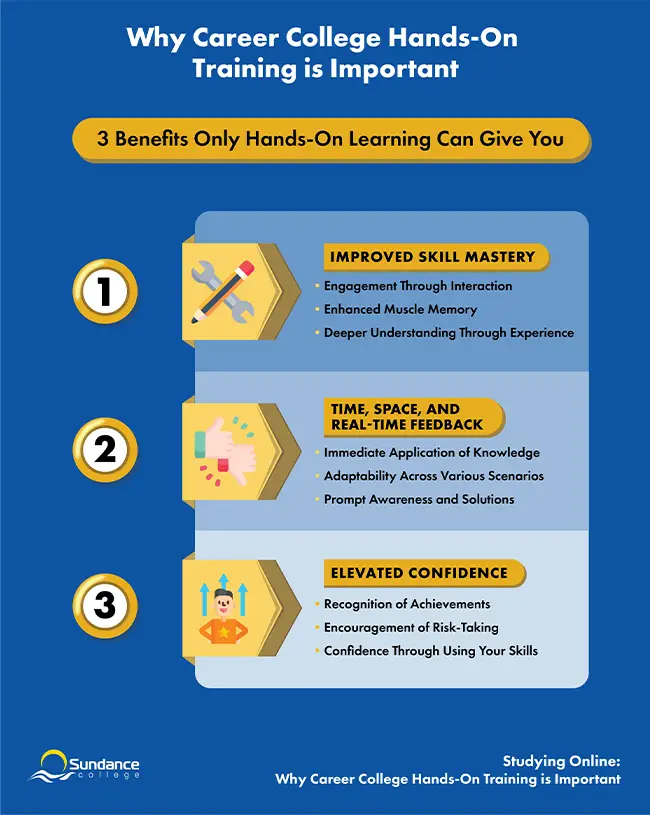
Whether it’s performing procedures, working with industry-specific software, or collaborating in teams, hands-on training can bring a number of benefits to your healthcare career:
1. Hands-On Learning Improves Your Skill Mastery
While reading and studying are important, genuine proficiency in healthcare skills emerges through hands-on practice.
For instance, practicing cardiopulmonary resuscitation (CPR) techniques during your First Aid & CPR training course ensures you master the skills needed for responding to emergencies. Thus, when someone enters your workspace and suddenly becomes unconscious, you will be able to distinguish between a cardiac arrest and a heart attack, use an AED (Automatic External Defibrillator), perform chest compressions with the right depth and frequency, and more.
2. Hands-On Learning Gives You Time, Space, And Real-Time Feedback
In your future healthcare role, you’ll encounter a diverse range of individuals. For instance, if you pursue a career as an addictions worker, you might interact with patients exhibiting anxious, hostile, or even violent behavior.
During the Non-Violent Crisis Intervention Training, you can practice crisis management in the controlled space of the training room. In this simulated environment, you have the time and space to refine your patterns of behavior and reactions to different patient scenarios. Through mock group facilitation sessions and one-on-one discussions, you can hone tactics of prevention, verbal de-escalation, and safe intervention.
This Addictions program hands-on approach, enriched by real-time feedback from experienced instructors, helps you gain a strong skill set for confidently navigating the complexities of real-life situations in healthcare.
3. Hands-On Learning Elevates Your Confidence
Your confidence is a key outcome of effective hands-on training.
If you’re thinking of a career as a pharmacy assistant, part of your hands-on training involves mastering the Kroll Pharmacy Management System—an FYI, one of the most widely used software in Canadian pharmacies. In your studies, hands-on exercises will immerse you in creating e-receipts, managing drug stocks, and handling e-purchase orders within a simulated yet lifelike scenario. This repetitive practice not only enhances your technical proficiency but also instills a sense of confidence through automatic learning.
With this practical foundation, you’ll be well-equipped to handle a bustling pharmacy setting, effectively handling a line of customers. Your adeptness with industry-specific software, along with your customer service skills, will not only make everything flow smoother but will also impress your employer. This can help set you on a path to a great job in healthcare.
The Role of Hands-On Training in Healthcare Administrative and Support Careers
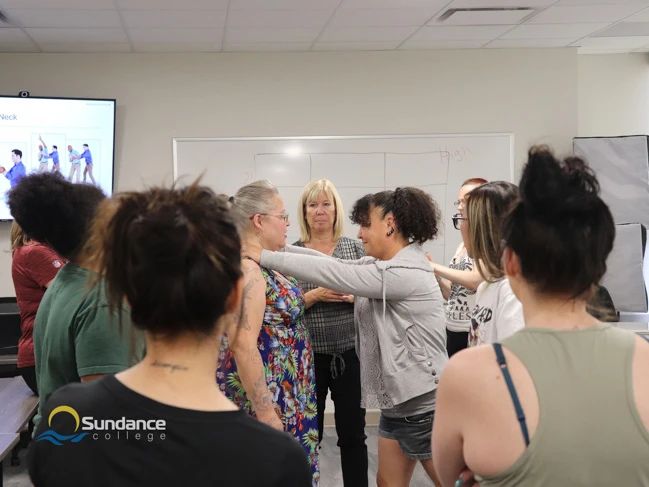
Now, let’s dive into three healthcare careers and the hands-on training that should be included in their post-secondary education programs.
Addictions And Community Health Professional Career & Hands-On Training
Exploring career paths in Addictions and Community Health, you’ll find a wide range of opportunities, such as:
- child/youth care workers
- family support workers
- community outreach support workers
- corrections facilities workers
- women’s shelter workers, and more
To excel in this field, you need to take a comprehensive career training program. It should cover essential knowledge in addiction psychology, relapse prevention, and intervention, alongside emphasizing family dynamics, counseling, and interviewing skills. Equally important is extensive hands-on practice.
Take the Intake Procedures & Treatment Planning course in Sundance’s Addictions and Community Health education program, for instance. Through hands-on exercises like role-playing and receiving feedback, our students are able to actively refine their intake and assessment skills.
To get even better experiences from studying in a career college, our program offers 7 weeks of practical work experience in a healthcare center.
Medical Office Administrator Career And Hands-On Training
Exploring career paths in Medical Office Administration, you’ll discover opportunities as:
- Medical office assistant
- Medical receptionist
- Hospital unit clerk
- Hospital admitting clerk
- Patient coordinator
- Clinic coordinator/manager, and more
The career training program you need to take to succeed in this field should focus on essential medical office assistant skills such as healthcare billing, medical office procedures, healthcare terminology and transcription, and records management.
In terms of hands-on learning, during our Medical Office Administration & Health Unit Coordinator (MOA) program, for instance, our students actively practice First Aid and CPR, vital sign measurement, industry-specific software, and more.
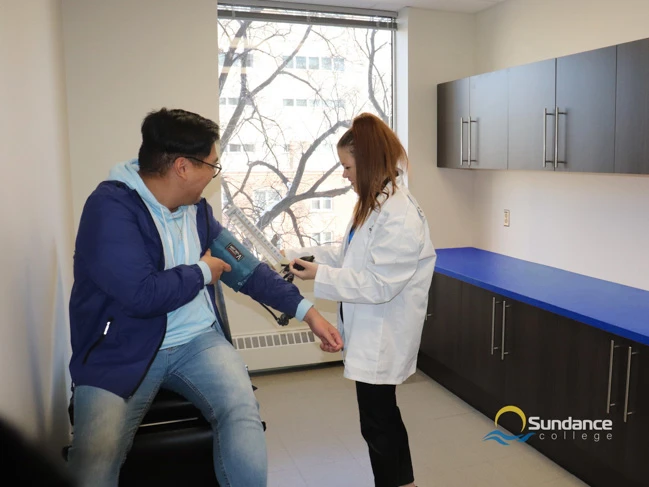
Moreover, they are able to solidify their knowledge and skills in a 5-week practicum in a healthcare office or medical clinic, gaining on-the-job training for a seamless transition into the workforce.
Pharmacy Assistants Career And Hands-On Training
If you’re dreaming of working in a pharmacy, you have the following roles to choose from:
- pharmacy assistant
- central fill dispensary assistant
- pharmaceutical business development assistant, and more
Similar to the above-described two career paths, a comprehensive career training program is essential for success in the pharmaceutical field. Your career program should focus on core pharmacy assistant skills such as understanding pharmacy procedures, filling prescriptions, preparing and labeling various prescription drugs, and serving customers.
In the Pharmacy Assistant diploma program at Sundance, students get extensive hands-on training in compounding, pharmacy calculations, community and institutional pharmacy procedures, and the filling and dispensing of various prescription drugs, along with the use of pharmacy management software.
For the online format, students watch demonstrations of pharmacy procedures and practices, followed by assignments designed to encourage practical application (e.g., calculating drug dosages). On campus, students have hands-on learning experiences in our pharmacy labs.
The program also provides practical work experience through a 7-week practicum. This hands-on experience allows students to apply their knowledge in a real-world pharmacy environment, ensuring they are well-prepared for the challenges of the profession.
Hands-On Learning Impact: What Graduates Think
We’d like to introduce you to Mylene C., one of our Pharmacy Assistant graduates. Mylene completed her practicum at Rexall Pharmacy, and shared a review of her experience while at Sundance:
“I am grateful I am studying in this wonderful college with amazing and lovely people giving immense support to all their students. I had an amazing experience starting from inquiries to registration, student aid application, orientation, going through the courses for my program, tech support, and practicum placement. All the staff and Instructors are very kind and accommodating. They are willing to go the extra mile to support their students. Many thanks and kudos to all the Sundance Team for all their commitment and dedication.”
Mylene’s positive experience highlights the impact of hands-on training on her success. Hands-on training, including a practicum, helps students transition from student life to a fulfilling healthcare career.
Sundance College’s Commitment to Hands-On Learning
As our health and social services diploma programs consistently earn positive reviews from graduates like Mylene, you might be curious about the resources we offer to ensure our healthcare students not only gain theoretical knowledge but also hands-on practical experiences. Here’s a glimpse of these valuable resources:
1. First Aid & CPR Training Rooms
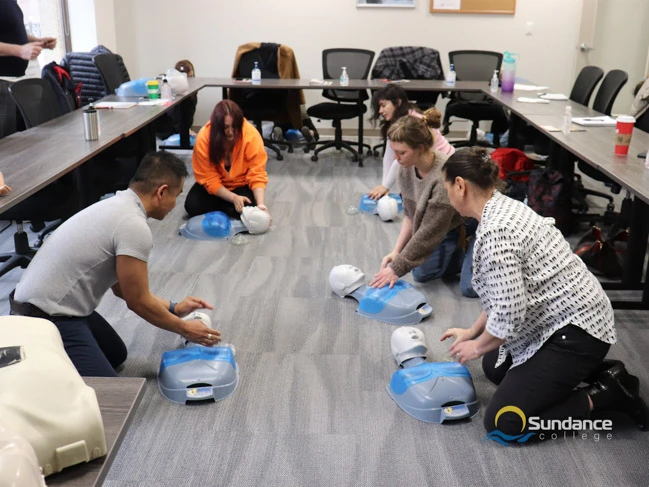
Our students can take hands-on learning in our specialized First Aid & CPR Training Rooms, equipped with life-like dummies for practicing essential life-saving techniques. From bandaging wounds to performing chest compressions, these purpose-built spaces ensure our students gain practical skills vital for real-world scenarios.
2. Pharmacy Laboratories
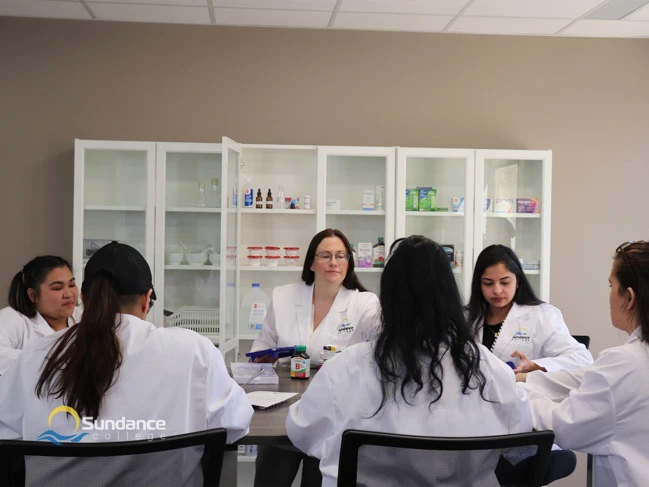
We provide students with pharmacy labs, where hands-on experiences come to life. Here, they practice how to compound pharmaceuticals, prepare labels, and dispense drugs. These sessions bridge the gap between theory and practice, helping our graduates be prepared for a career in a pharmacy setting.
3. Learning Centers For Training On Industry-Specific Software
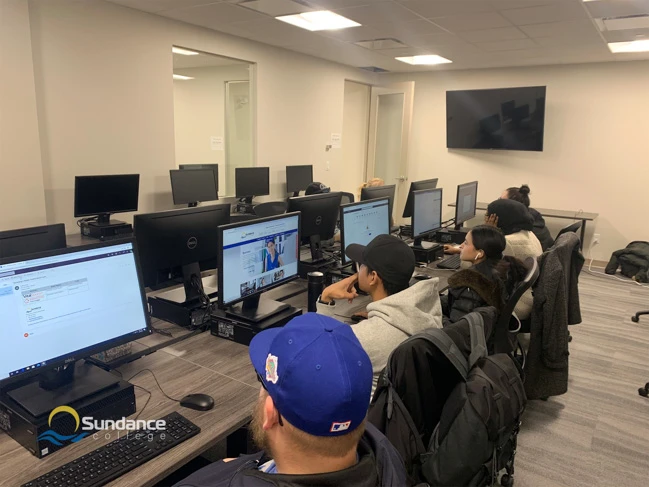
We have learning centers equipped with computers for students on campus and a laptop program for those studying from home. So, whether you’re in-person or online, you’ll have access to industry-specific software like the Kroll system to learn and master it with the support from our technical assistants whenever needed.
All these resources are accessible online and on the Sundance College campuses in Calgary, Edmonton, and Winnipeg.
Would you like to explore firsthand our campus-based healthcare learning experience? Book a tour and discover the Sundance College facilities, hands-on learning resources, and supportive community that await you on your journey to a successful healthcare career!
Building Tomorrow’s Healthcare Leaders Through Hands-On Training
In healthcare, hands-on training is not just a supplement — it’s a necessity. Sundance College’s commitment to hands-on training persists for all students, whether participating online or on campus. We recognize the diversity in learning preferences, which is why we prioritize flexibility. The choice is yours in selecting the method that aligns best with your needs.
Ready to become a part of our community? Get in touch with our admission advisors and explore the benefits of hands-on training, accessible both on campus and online. Explore the variety of career training programs waiting for you at Sundance College.
Subscribe for more career advice
Blog Categories
Share on:
